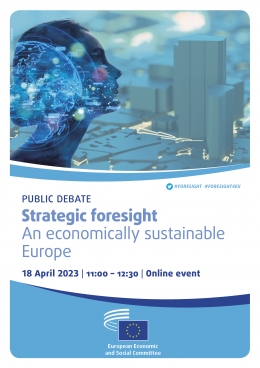European Economic
and Social Committee
Main navigation
-
Despre noi
ABOUT
The European Economic and Social Committee (EESC) is the voice of organised civil society in Europe.
Find out more about its role and structure at http://www.eesc.europa.eu/en/about
- Organizarea politică
- Organizarea administrativă
- COOPERARE CU ALTE INSTITUȚII
- Rules
-
Activitatea noastră
OUR WORK
The EESC issues between 160 and 190 opinions and information reports a year.
It also organises several annual initiatives and events with a focus on civil society and citizens’ participation such as the Civil Society Prize, the Civil Society Days, the Your Europe, Your Say youth plenary and the ECI Day.
Find the latest EESC opinions and publications at http://www.eesc.europa.eu/en/our-work/opinions-information-reports/opinions and http://www.eesc.europa.eu/en/our-work/publications-other-work/publications respectively.
- Avize și rapoarte de informare
- Documente
- Publicații și alte lucrări
-
Societatea civilă și participarea cetățenilor
- Civil Society Week
- European elections 2024
- Premiul pentru societatea civilă
- The Conference on the Future of Europe
- Pașaportul pentru democrație europeană
- Europa ta, părerea ta!
- Inițiativa cetățenească europeană (ICE)
- The path to our industrial future
- Youth Climate and Sustainability Round Tables
- EU Organic Awards
- Civil Society Against COVID 19
- EESC stands with Ukraine
- Partnerships
- Relations with ESCs
-
Politici
POLICIES
The EESC is active in a wide range of areas, from social affairs to economy, energy and sustainability.
Learn more about our policy areas and policy highlights at http://www.eesc.europa.eu/en/policies
-
Domenii de politică
- Agricultură, dezvoltare rurală și pescuit
- Politici climatice
- Politica de coeziune, regională și urbană
- Consumatori
- Tranziția la tehnologia digitală și societatea informațională
- Uniunea economică și monetară
- Educație și formare
- Ocuparea forței de muncă
- Energie
- Întreprinderi
- Mediu
- Relații externe
- Servicii financiare și piețe de capital
- Drepturi fundamentale și drepturile cetățenilor
- Housing
- Industrie și mutații industriale
- Afaceri instituționale și bugetul UE
- Migrație și azil
- Cercetare și inovare
- Servicii de interes general
- Piața unică
- Afaceri sociale
- Dezvoltare durabilă
- Impozitare
- Transporturi
-
În prim-plan
- Call to EU candidate countries civil society
- EESC stands with Ukraine
- The Conference on the Future of Europe
- Platforma europeană a părților interesate privind economia circulară
- European Gender Equality Week
- COP 29
- Youth participation at the EESC
- EU Blue Deal
- Cost of living
- ConnectingEU
- EU Rural Pact
-
Domenii de politică
-
Agendă
AGENDA
The EESC holds nine plenary sessions per year. It also organises many conferences, public hearings and high-level debates related to its work.
Find out more about our upcoming events at http://www.eesc.europa.eu/en/agenda/our-events/upcoming-events
- Evenimentele noastre
-
Actualități și media
NEWS & MEDIA
Here you can find news and information about the EESC'swork, including its social media accounts, the EESC Info newsletter, photo galleries and videos.
Read the latest EESC news http://www.eesc.europa.eu/en/news-media/news and press releases http://www.eesc.europa.eu/en/news-media/press-releases
- President
-
Membri și grupuri
MEMBERS & GROUPS
The EESC brings together representatives from all areas of organised civil society, who give their independent advice on EU policies and legislation. The EESC's326 Members are organised into three groups: Employers, Workers and Various Interests.
Find out more about our Members and groups at http://www.eesc.europa.eu/en/members-groups
- Membri
- Grupuri
-
Secțiuni și alte organe
SECTIONS & OTHER BODIES
The EESC has six sections, specialising in concrete topics of relevance to the citizens of the European Union, ranging from social to economic affairs, energy, environment, external relations or the internal market.
Find out more at http://www.eesc.europa.eu/en/sections-other-bodies
-
Secțiuni / Comisii
- Secțiunea pentru uniunea economică și monetară și coeziune economică și socială (ECO)
- Secțiunea pentru piața unică, producție și consum (INT)
- Secțiunea pentru transporturi, energie, infrastructură și societatea informațională (TEN)
- Secțiunea pentru ocuparea forței de muncă, afaceri sociale și cetățenie (SOC)
- Secțiunea pentru agricultură, dezvoltare rurală și protecția mediului (NAT)
- Secțiunea pentru relații externe (REX)
- Comisia consultativă pentru mutații industriale (CCMI)
- Observatoare
- Alte organe
-
Secțiuni / Comisii
- Ukraine



